-
ORIGINAL ARTICLE07-29-2024
Evidence of validity of the Risk Self-Medication Questionnaire focused on Health Literacy
Revista Brasileira de Enfermagem. 2024;77(3):e20230386
Abstract
ORIGINAL ARTICLEEvidence of validity of the Risk Self-Medication Questionnaire focused on Health Literacy
Revista Brasileira de Enfermagem. 2024;77(3):e20230386
DOI 10.1590/0034-7167-2023-0386
Views0See moreABSTRACT
Objectives:
to analyze the validity evidence of the internal structure of the Risk Self-Medication Questionnaire Focused on Health Literacy.
Methods:
a psychometric study with 499 adults. The internal structure was assessed with exploratory and confirmatory factor analysis to prove the adjustment. Internal consistency was measured by composite reliability and McDonald’s omega coefficient (ω).
Results:
the parameters revealed a model of 35 items distributed across four factors, explaining 56% of the total variance, with factor loadings ranging from 0.31 to 0.85 and adequate communalities. Accuracy (0.79
Conclusions:
an instrument was obtained with good evidence of structural validity for measuring self-medication.
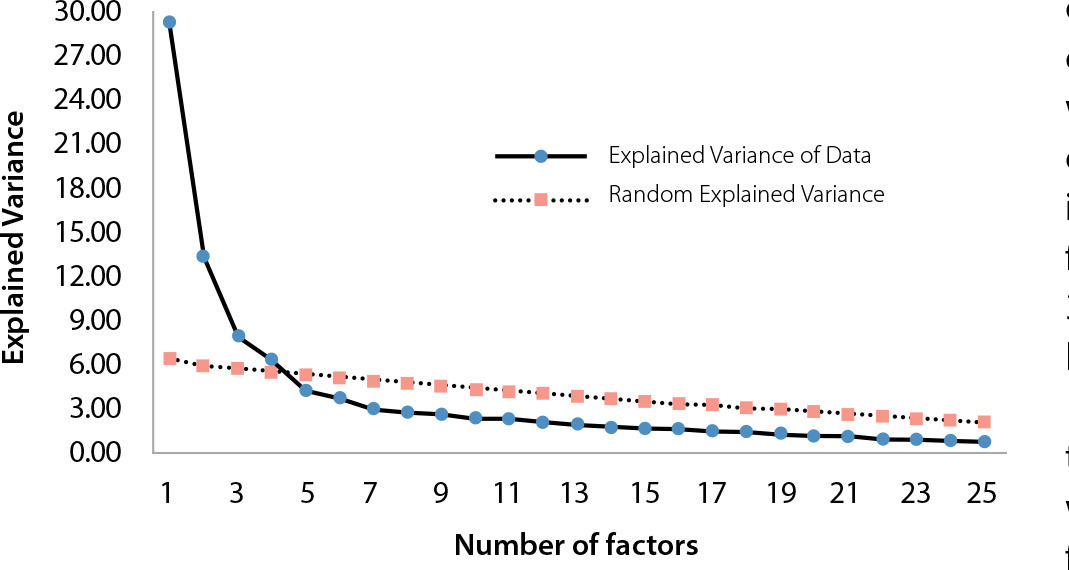
-
ORIGINAL ARTICLE07-29-2024
Nurses’ perspectives on nurses’ work methods
Revista Brasileira de Enfermagem. 2024;77(3):e20230374
Abstract
ORIGINAL ARTICLENurses’ perspectives on nurses’ work methods
Revista Brasileira de Enfermagem. 2024;77(3):e20230374
DOI 10.1590/0034-7167-2023-0374
Views0See moreABSTRACT
Objectives:
To analyze nurses’ perspectives on nurses’ work methods in the hospital context.
Methods:
A descriptive study with a qualitative approach was conducted in a hospital in northern Portugal, involving 17 nurses. Semi-structured interviews were used for data collection. Data collected between May and June 2023 underwent content analysis, supported by Atlas.ti software.
Results:
Three thematic areas emerged: “Nurses’ work methods in a hospital context,” highlighting the conception and components of work methods and the methods in use; “Implementation of nurses’ work methods,” emphasizing influencing factors and challenges to implementation; and “Impact of nurses’ work methods on patients, nurses, and institutions.”
Final Considerations:
Nurses’ work methods constitute the structure of nursing care. Some factors influence and some challenges arise in the implementation of these methods, producing impacts on patients, nurses, and institutions.

-
ORIGINAL ARTICLE07-29-2024
Nursing Process for institutionalized older adults: contributions from knowledge awareness workshop
Revista Brasileira de Enfermagem. 2024;77(3):e20230349
Abstract
ORIGINAL ARTICLENursing Process for institutionalized older adults: contributions from knowledge awareness workshop
Revista Brasileira de Enfermagem. 2024;77(3):e20230349
DOI 10.1590/0034-7167-2023-0349
Views0See moreABSTRACT
Objective:
To analyze the knowledge of professionals working in a Nursing Home about the Nursing Process before and after the awareness workshop.
Methods:
This is strategic action research, developed with nursing professionals and managers of a Nursing Home in Rio Grande do Sul, Brazil. Data were collected between January and June 2023, through semi-structured interviews before and after an awareness workshop. Discursive textual analysis of the data was carried out.
Results:
The central category “Understanding about the Nursing Process in Nursing Homes” emerged, which was unitized into two units of meaning and three categories of analysis.
Conclusion:
Data revealed non-use and lack of knowledge of the Nursing Process before awareness raising. Afterwards, a deeper understanding of the topic and its importance was identified. Awareness-raising workshops contribute to transformation of knowledge.
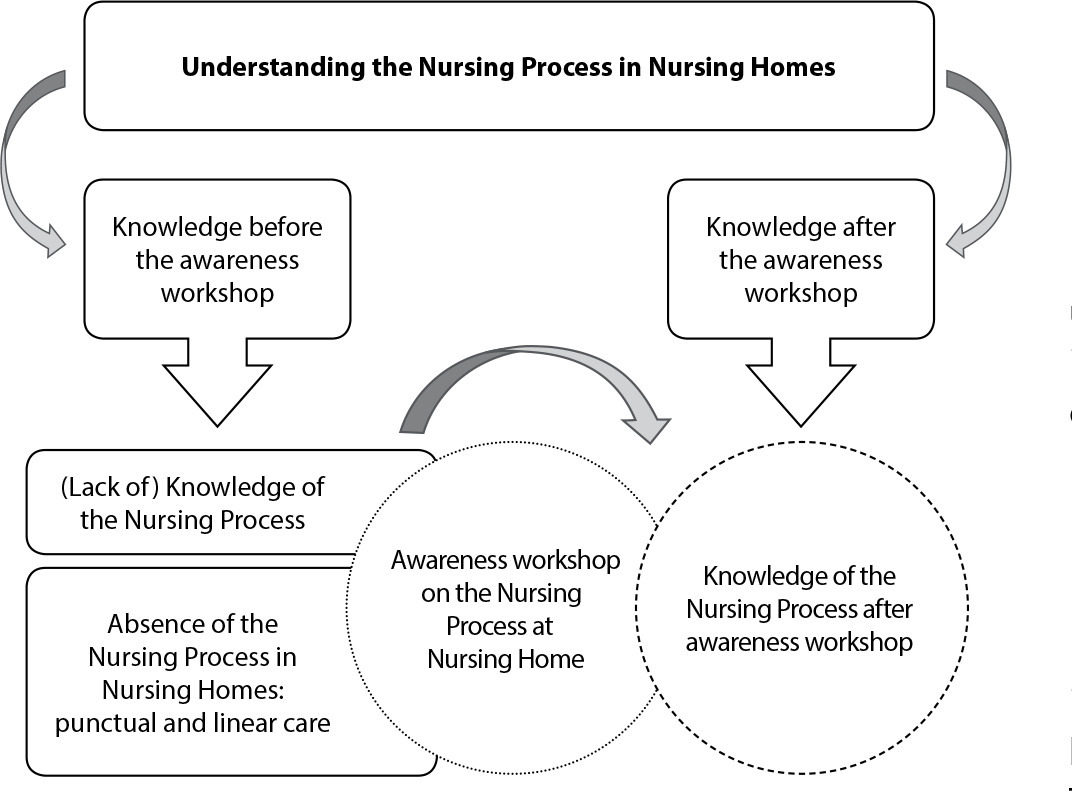
-
ORIGINAL ARTICLE07-29-2024
Excessive daytime sleepiness in nursing technicians: association with sleep quality and memory
Revista Brasileira de Enfermagem. 2024;77(3):e20230332
Abstract
ORIGINAL ARTICLEExcessive daytime sleepiness in nursing technicians: association with sleep quality and memory
Revista Brasileira de Enfermagem. 2024;77(3):e20230332
DOI 10.1590/0034-7167-2023-0332
Views0See moreABSTRACT
Objective:
to investigate excessive daytime sleepiness prevalence among nursing technicians and the association with sleep quality and memory.
Methods:
a cross-sectional, inferential study, carried out in a hospital unit in the state of Goiás between December 2020 and January 2021. Assessments were carried out using the Epworth Sleepiness Scale, the Pittsburgh Sleep Quality Index and the Prospective and Retrospective Memory Questionnaire, instruments validated for the Brazilian context. Bivariate and multivariate logistic regression analyzes were performed.
Results:
the sample consisted of 189 nursing technicians with a 40.9% excessive daytime sleepiness prevalence. In multivariate models, excessive daytime sleepiness was not associated with sleep quality, however there was a significant association with overall memory failures.
Conclusions:
study results demonstrate a high excessive daytime sleepiness occurrence, an association with overall memory failures and the need for psychosocial interventions for nursing technicians.
-
ORIGINAL ARTICLE07-29-2024
Educational technology for multidisciplinary training for managing waiting lists for elective patients
Revista Brasileira de Enfermagem. 2024;77(3):e20230299
Abstract
ORIGINAL ARTICLEEducational technology for multidisciplinary training for managing waiting lists for elective patients
Revista Brasileira de Enfermagem. 2024;77(3):e20230299
DOI 10.1590/0034-7167-2023-0299
Views1See moreABSTRACT
Objectives:
to construct and assess an educational technology for managing patient waiting lists for multidisciplinary training.
Methods:
study supported by Instructional Design – ADDIE model, whose stages of construction of educational technology were developed in the form of a multi-professional training course. Its respective content assessment was carried out by a committee of experts from 2021 to 2022. The analysis occurred based on the proportion of content adequacy with 95% Confidence Interval.
Results:
seventeen products were created as educational technology learning objects: five storyboards; four videos; three comic books; two pedagogical action plans; a mind map; and a YouTube® playlist. Nine experts assessed content adequacy, which reached 0.89.
Conclusions:
this educational technology contributes to the performance of professionals who manage waiting lists by reducing inequalities, alleviating differences, in addition to promoting equity in care and good health for patients in the Brazilian Health System.

-
ORIGINAL ARTICLE07-29-2024
Fuzzy Logic: vulnerability of women who have sex with women to sexually transmitted infections
Revista Brasileira de Enfermagem. 2024;77(3):e20230271
Abstract
ORIGINAL ARTICLEFuzzy Logic: vulnerability of women who have sex with women to sexually transmitted infections
Revista Brasileira de Enfermagem. 2024;77(3):e20230271
DOI 10.1590/0034-7167-2023-0271
Views0See moreABSTRACT
Objective:
To describe the possibility of applying Fuzzy Logic in analyzing the vulnerability of Women Who Have Sex with Women to Sexually Transmitted Infections/HIV/AIDS.
Methods:
We developed a Fuzzy Logic system with 17 input variables and one output variable, using data related to vulnerability in a municipality located in the Midwest region of the State of São Paulo, Brazil.
Results:
The factor with the greatest positive impact was the confirmation that a low understanding of Sexually Transmitted Infections/HIV/AIDS is associated with higher vulnerability. Conversely, the statement “Not disclosing sexual activity to healthcare professionals,” where individuals do not admit to having sex with women, had the least impact.
Conclusions:
Fuzzy Logic facilitates the identification of vulnerability, expressed through the analysis of interaction between variables in each dimension. This makes it a promising method to assist in analyzing the vulnerability of specific populations.
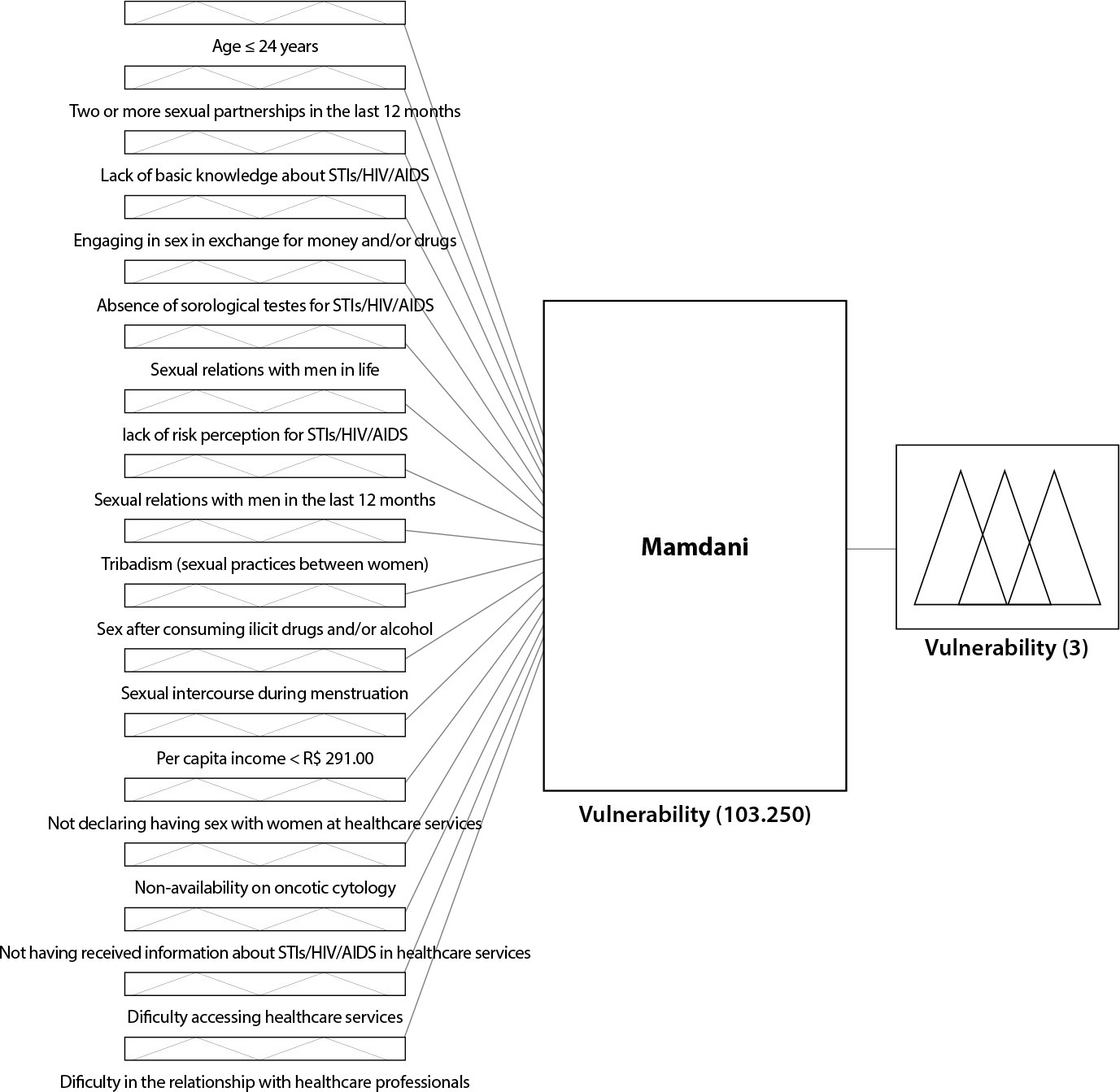
-
ORIGINAL ARTICLE07-29-2024
University Student Depression Inventory, Brazilian Version, Construct Assessment
Revista Brasileira de Enfermagem. 2024;77(3):e20230232
Abstract
ORIGINAL ARTICLEUniversity Student Depression Inventory, Brazilian Version, Construct Assessment
Revista Brasileira de Enfermagem. 2024;77(3):e20230232
DOI 10.1590/0034-7167-2023-0232
Views0See moreABSTRACT
Objectives:
to assess the University Student Depression Inventory, Brazilian version (USDI-BR), construct.
Methods:
a methodological study carried out with a snowball probabilistic sample, consisting of 334 undergraduate and graduate students. Confirmatory factor analysis, reliability using McDonald’s omega coefficient and Cronbach’s alpha were performed. Principal component analysis was performed using the varimax rotation and oblimin rotation, using the Kaiser-Meyer-Olkin criteria, Bartlett’s test of sphericity and scree plot.
Results:
the USDI-BR presented an internal consistency of items of ω = 0.95 and remained with 30 items, with the addition of 1 factor (Death wish and social withdrawal), totaling 4 factors.
Conclusions:
the USDI-BR has evidence that points to its validity and also its internal consistency, deserving that new studies be carried out to expand the evidence of its psychometric properties.
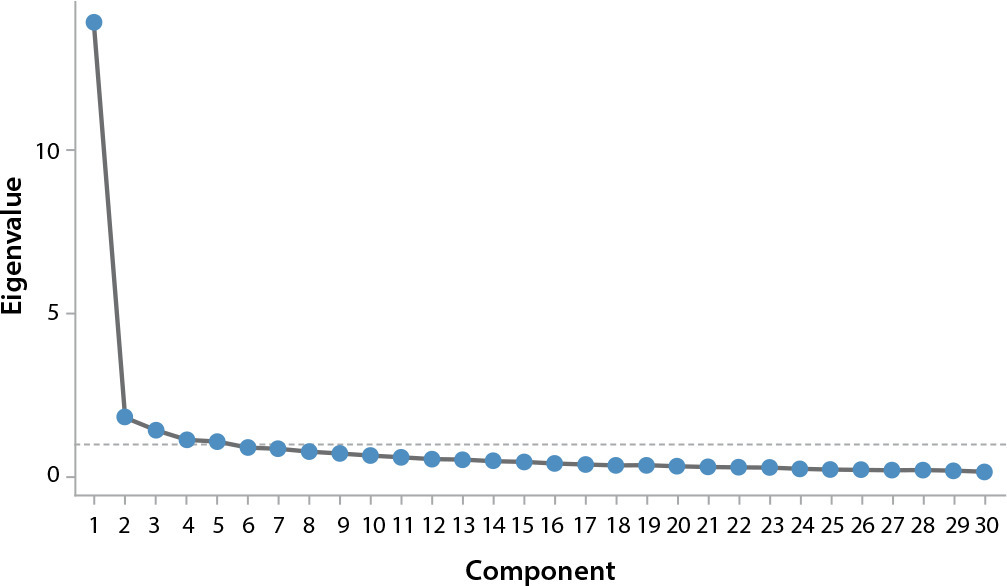
-
ORIGINAL ARTICLE07-29-2024
Family refusal of skin donation for transplantation: trends and associated factors
Revista Brasileira de Enfermagem. 2024;77(3):e20230209
Abstract
ORIGINAL ARTICLEFamily refusal of skin donation for transplantation: trends and associated factors
Revista Brasileira de Enfermagem. 2024;77(3):e20230209
DOI 10.1590/0034-7167-2023-0209
Views0See moreABSTRACT
Objectives:
to analyze the trends and factors associated with family refusal of skin donation for transplantation.
Methods:
this cross-sectional study was conducted in the State of São Paulo, with family authorization terms collected from 2001 to 2020. The variables analyzed included year, age, gender, cause of death, and type of institution. Data were analyzed using linear and multiple logistic regression, with the Odds Ratio estimated at p<0.05 for statistical significance.
Results:
1,355 individuals refused skin donation. The trend of refusals decreased between 2001 and 2009 in the age groups of 0-11 years and 12-19 years, but increased in the group aged ≥60 years. This trend continued to decrease in the 0-11 years group from 2010 to 2020, and increased in the 20-40 years group. Males and the age groups of 20-40 years, 41-59 years, and ≥60 years exhibited 27%, 34%, 47%, and 53% lower chances of refusal, respectively.
Conclusions:
there is an urgent need for measures to mitigate the high number of refusals associated with skin donation.
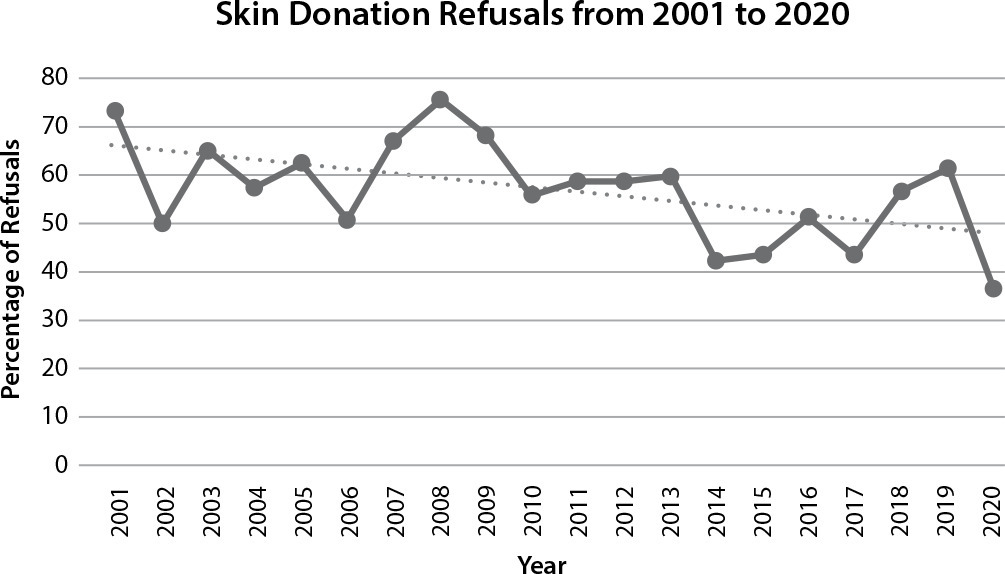
-
09-04-2023
Chronicity in the 21st century: facing the challenges of a changing society
Revista Brasileira de Enfermagem. 2023;76(4):e760401
Abstract
Chronicity in the 21st century: facing the challenges of a changing society
Revista Brasileira de Enfermagem. 2023;76(4):e760401
DOI 10.1590/0034-7167.2023760401
Views0Currently, there is an increase in non-communicable diseases (NCDs), population aging and changes in lifestyle, which corroborates the increase in chronicity, one of the greatest challenges faced by contemporary society. In this editorial, we will examine chronicity in the 21st century and the need to address this problem in a comprehensive and sustainable way.In recent […]See more -
ORIGINAL ARTICLE09-04-2023
Impact of an educational intervention on standard precautions during the COVID-19 pandemic
Revista Brasileira de Enfermagem. 2023;76(4):e20220750
Abstract
ORIGINAL ARTICLEImpact of an educational intervention on standard precautions during the COVID-19 pandemic
Revista Brasileira de Enfermagem. 2023;76(4):e20220750
DOI 10.1590/0034-7167-2022-0750
Views0See moreABSTRACT
Objective:
To evaluate the impact of an educational intervention on the knowledge of nursing professionals regarding standard precautions.
Methods:
This is an almost experimental study conducted with 100 nursing professionals. Data collection was performed using a sociodemographic characterization instrument and the Standard Precautions Knowledge Questionnaire. The educational intervention was based on five moments, where the approach to questions with less than 70% accuracy was intensified.
Results:
There was a significant difference between the scores of healthcare professionals before (16.20 ± 1.51) and after (16.90 ± 1.31) the educational intervention (W=3.336; p < 0.05). Regarding knowledge about hand hygiene after glove use, an increase in knowledge from 83% to 93% was obtained.
Conclusions:
A positive effect on the professionals’ knowledge was recorded, demonstrating advances regarding the strengthening of already acquired knowledge and the understanding of new knowledge.

-
ORIGINAL ARTICLE09-04-2023
Financial toxicity in people with chronic kidney disease undergoing hemodialysis treatment
Revista Brasileira de Enfermagem. 2023;76(4):e20220671
Abstract
ORIGINAL ARTICLEFinancial toxicity in people with chronic kidney disease undergoing hemodialysis treatment
Revista Brasileira de Enfermagem. 2023;76(4):e20220671
DOI 10.1590/0034-7167-2022-0671
Views0See moreABSTRACT
Objective:
to assess the financial toxicity of people with chronic kidney disease undergoing hemodialysis treatment.
Method:
a descriptive analytical cross-sectional study, carried out with 214 people, between February and May 2022. For data collection, a sociodemographic and clinical instrument and the COmprehensive Score for financial Toxicity were used. For analysis, the Odds Ratio, ANOVA and Cronbach’s alpha tests were used.
Results:
the mean financial toxicity score was 20.30. Women with a monthly family income of at most two minimum wages are more likely to have some degree of financial toxicity (Odds Ratio: 0.85; 0.76).
Conclusion:
financial toxicity was identified to different degrees and varied according to sociodemographic and clinical characteristics. Measuring financial toxicity can help nurses plan care and develop strategies to avoid interrupting treatment.

-
ORIGINAL ARTICLE09-04-2023
Content validity evidence of the Brazilian version of the Cognitive Symptom Checklist-Work-21
Revista Brasileira de Enfermagem. 2023;76(4):e20220453
Abstract
ORIGINAL ARTICLEContent validity evidence of the Brazilian version of the Cognitive Symptom Checklist-Work-21
Revista Brasileira de Enfermagem. 2023;76(4):e20220453
DOI 10.1590/0034-7167-2022-0453
Views0See moreABSTRACT
Objective:
to cross-culturally adapt and assess the content validity evidence of the Cognitive Symptom Checklist-Work-21 for the Brazilian context.
Method:
a psychometric study of cross-cultural adaptation, covering the stages of translation, reconciliation, back-translation, intercultural equivalence assessment and content validity evidence analysis, considering Content Validity Ratio parameters in breast cancer survivors.
Results:
the translations were equivalent to the original version. Colloquial expressions were modified, tense, verbal adjusted, and two items containing multiple commands were separated. The final version now contains 22 items, presenting semantic, conceptual, idiomatic and experimental equivalences. The pre-test indicated good understanding and ease in the response process.
Conclusion:
the final version was defined as “Lista de verificação de sintomas cognitivos relacionados ao trabalho – 22 itens”, showing good linguistic equivalence and strong evidence of content validity in the Brazilian context.

-
08-21-2023
Percepciones, maltrato y religión como predictores del impacto psicoemocional en enfermeros durante la pandemia COVID-19
Revista Brasileira de Enfermagem. 2023;76(3):e20220768
Abstract
Percepciones, maltrato y religión como predictores del impacto psicoemocional en enfermeros durante la pandemia COVID-19
Revista Brasileira de Enfermagem. 2023;76(3):e20220768
DOI 10.1590/0034-7167-2022-0768es
Views0See moreRESUMEN
Objetivos:
analizar la relación entre percepciones, maltrato y religión con el impacto psicoemocional en enfermeros durante la pandemia por covid-19.
Métodos:
estudio transversal descriptivo-analítico. Fue realizado entre los años 2020 y 2021; se encuestó a 319 enfermeros asistenciales de Perú mediante DASS-21; se evaluaron asociaciones mediante Rho de Spearman y regresión múltiple.
Resultados:
el 18,5 % presentó algún grado de estrés; el 50,2 %, ansiedad y el 29,1 %, depresión. La experiencia de maltrato, la autopercepción de la salud mental y la religión fueron predictores de estrés, ansiedad y depresión. El tiempo de experiencia laboral predice el estrés y ansiedad. Además, la autopercepción de la información y el género fueron predictores de la depresión.
Conclusiones:
los enfermeros peruanos presentaron altos niveles de estrés, ansiedad y depresión; y este impacto psicoemocional estuvo asociado a las percepciones, experiencias de maltrato y la religión.
-
ORIGINAL ARTICLE08-21-2023
Perceptions, maltreatment and religion as predictors of the psycho-emotional impact on nurses during the COVID-19 pandemic
Revista Brasileira de Enfermagem. 2023;76(3):e20220768
Abstract
ORIGINAL ARTICLEPerceptions, maltreatment and religion as predictors of the psycho-emotional impact on nurses during the COVID-19 pandemic
Revista Brasileira de Enfermagem. 2023;76(3):e20220768
DOI 10.1590/0034-7167-2022-0768
Views0See moreABSTRACT
Objectives:
to analyze the relationship between perceptions, abuse and religion with the psycho-emotional impact on nurses during the COVID-19 pandemic.
Methods:
descriptive-analytical cross-sectional study. It took place between 2020 and 2021 and a total of 319 clinical nurses in Peru were interviewed using the DASS-21. Associations were assessed using Spearman’s Rho and multiple regression.
Results:
18.5% had some degree of stress; 50.2%, anxiety and 29.1%, depression. Experience of abuse, self-perception of mental health and religion were predictors of stress, anxiety and depression. The length of work experience predicts stress and anxiety. In addition, self-perception of information and gender were predictors of depression.
Conclusions:
peruvian nurses have high levels of stress, anxiety and depression, and this psycho-emotional impact was associated with perceptions, experiences of abuse and religion.
-
ORIGINAL ARTICLE08-21-2023
Assessment of the Psychosocial Care Center multidisciplinary team from users’ and family members’ perspective
Revista Brasileira de Enfermagem. 2023;76(3):e20220645
Abstract
ORIGINAL ARTICLEAssessment of the Psychosocial Care Center multidisciplinary team from users’ and family members’ perspective
Revista Brasileira de Enfermagem. 2023;76(3):e20220645
DOI 10.1590/0034-7167-2022-0645
Views0See moreABSTRACT
Objectives:
to assess the multidisciplinary team of a Psychosocial Care Center I from users’ and family members’ perspective.
Methods:
an evaluative study, anchored in the fourth generation evaluation theoretical-methodological framework, carried out in a Psychosocial Care Center I, from September 2021 to March 2022. Eleven users and 06 family members participated. Data were collected through non-participant observation, individual interviews and negotiation sessions, and analyzed using the Constant Comparative Method, using the MAXQDA software.
Results:
the team develops its care based on individual and collective care, with integrated and complementary work by professionals. They seek to facilitate treatment initiation and continuation, considering health needs and offering support, understanding and guidance to users and their families.
Final Considerations:
the multidisciplinary team’s work is based on the psychosocial paradigm, which can qualify care and strengthen the service role in the mental health network.

-
ORIGINAL ARTICLE08-21-2023
Effectiveness of educational intervention among seropositive women about knowledge about HIV sexual transmission
Revista Brasileira de Enfermagem. 2023;76(3):e20220371
Abstract
ORIGINAL ARTICLEEffectiveness of educational intervention among seropositive women about knowledge about HIV sexual transmission
Revista Brasileira de Enfermagem. 2023;76(3):e20220371
DOI 10.1590/0034-7167-2022-0371
Views0See moreABSTRACT
Objectives:
to assess the effectiveness of a group and telephone educational intervention with seropositive women about knowledge about HIV sexual transmission prevention.
Methods:
a quasi-experimental before-and-after study, carried out with 151 women living with HIV in a Specialized Care Service in a Brazilian capital. The educational intervention was carried out in three moments, with the assessment being carried out before the first and after the last moment.
Results:
97.4% of study participants were cisgender women aged between 18 and 58 years; 55.6% considered themselves brown; and 32.5% of interviewees had elementary school. Regarding knowledge about HIV sexual transmission, in 78.5% of items, there was an association (p<0.005) with increased participants’ knowledge after receiving the intervention.
Conclusions:
the educational intervention helped to increase the knowledge of women living with HIV about the sexual transmission of the infection.

-
12-04-2023
A cronicidade e o seu impacto na saúde do trabalhador: uma chamada para ações concretas
Revista Brasileira de Enfermagem. 2023;76:e76suppl301
Abstract
A cronicidade e o seu impacto na saúde do trabalhador: uma chamada para ações concretas
Revista Brasileira de Enfermagem. 2023;76:e76suppl301
DOI 10.1590/0034-7167.202376suppl301pt
Views0A relação entre cronicidade e trabalho tem sido uma preocupação crescente na sociedade contemporânea. À medida que o número de doenças crônicas aumenta em todo o mundo, é fundamental compreender como essas condições impactam a saúde dos trabalhadores(). Neste editorial, exploraremos os impactos da cronicidade na saúde do trabalhador, destacando dados da Carga Global de […]See more -
12-04-2023
Chronicity and its impact on workers’ health: a call for concrete actions
Revista Brasileira de Enfermagem. 2023;76:e76suppl301
Abstract
Chronicity and its impact on workers’ health: a call for concrete actions
Revista Brasileira de Enfermagem. 2023;76:e76suppl301
DOI 10.1590/0034-7167.202376suppl301
Views0The relationship between chronicity and work has been a growing concern in contemporary society. As the number of chronic illnesses increases around the world, it is critical to understand how these conditions impact workers’ health(). In this editorial, we will explore the impacts of chronicity on workers’ health, highlighting data from the Global Burden of […]See more -
12-04-2023
General Law on Personal Data Protection and applicability to Nursing
Revista Brasileira de Enfermagem. 2023;76:e20230126
Abstract
General Law on Personal Data Protection and applicability to Nursing
Revista Brasileira de Enfermagem. 2023;76:e20230126
DOI 10.1590/0034-7167-2023-0126
Views0See moreABSTRACT
Objectives:
to reflect on the impacts of the General Personal Data Protection Law on Nursing practice.
Methods:
reflection article, through the intentional collection of materials relating to the topic.
Results:
legislation regulates confidentiality, processing and data sharing, requiring institutional protection measures. The nursing team is responsible for acting preventively, both in care and in the management role, in order to avoid the misuse of the patient’s personal data. The law allows academic research to be carried out as long as the purpose is clear, data collection occurs with an explicit purpose and data is anonymized.
Final Considerations:
although the General Personal Data Protection Law requires greater care in relation to data processing, it is established on precepts of good faith and respect for the rights of the individual, concepts aligned with the nursing code of ethics.

-
REVIEW12-04-2023
Supervision of professional nursing practice in Brazil: a scoping review
Revista Brasileira de Enfermagem. 2023;76:e20230077
Abstract
REVIEWSupervision of professional nursing practice in Brazil: a scoping review
Revista Brasileira de Enfermagem. 2023;76:e20230077
DOI 10.1590/0034-7167-2023-0077
Views0See moreABSTRACT
Objectives:
to map studies that analyze the audit process of nursing councils.
Methods:
this is a scoping review, anchored in the JBI framework, with the guiding question: what is the evidence of the audit process of legal practice of nursing by class councils (COFEN/COREN system)? The searches were carried out in October and November 2022 without limitation of language and year.
Results:
of the 9 selected studies, all are Brazilian and published from 2014 onwards. Among the topics addressed are the role, challenges, costs and difficulties in nurse auditors’ daily work process, in addition to the contribution of the audit sector in Brazil.
Conclusions:
the studies gathered discuss aspects related to costs, challenges and difficulties, but there is no focus on corrective, disciplinary and educational activities as well as little is said about the audit process, its reporting, referral and outcomes.

-
ORIGINAL ARTICLE12-04-2023
Overview of nursing ethics teaching in Brazilian public higher education institutions
Revista Brasileira de Enfermagem. 2023;76:e20220808
Abstract
ORIGINAL ARTICLEOverview of nursing ethics teaching in Brazilian public higher education institutions
Revista Brasileira de Enfermagem. 2023;76:e20220808
DOI 10.1590/0034-7167-2022-0808
Views0See moreABSTRACT
Objectives:
to outline the teaching of ethics in undergraduate Nursing programs in Brazilian public higher education institutions.
Methods:
descriptive and exploratory study, carried out through the documentary analysis of pedagogical projects of undergraduate Nursing programs in Brazil.
Results:
153 active undergraduate Nursing programs were found, of which 106 provide the pedagogical project. In addition to deontological teaching, the teaching of ethics was identified in a transversal way associated with themes such as Social Context, Hospital and Community Care, Pharmacology, Systematization of Nursing Care, Surgical Nursing, Epidemiology, Palliative Care, Management in Nursing, Diversity, Women’s, Children’s, Adolescent’s, Adult’s and Older People’s Health, and Mental Health.
Final Considerations:
the challenge in teaching nursing ethics is its integration with each action of caring, teaching and managing.

-
12-04-2023
La ética de la atención de enfermería a las personas transgénero
Revista Brasileira de Enfermagem. 2023;76:e20220797
Abstract
La ética de la atención de enfermería a las personas transgénero
Revista Brasileira de Enfermagem. 2023;76:e20220797
DOI 10.1590/0034-7167-2022-0797es
Views0See moreRESUMEN
Objetivos:
debatir sobre aspectos éticos en la atención de enfermería a personas transgénero.
Métodos:
estudio reflexivo fundamentado sobre los dilemas que se plantean en los cuidados de enfermería a personas transgénero. El relato se ha estructurado en torno a los cuatro principios bioéticos.
Resultados:
la atención sanitaria a las personas trans es compleja, transversal a muchos dispositivos y especialidades y longitudinal en el tiempo por lo que precisa de la actuación coordinada. Existe un marco ético en el que se encuadran los cuidados de enfermería que se precisan en la atención a este colectivo.
Consideraciones Finales:
la enfermera como agente de salud puede asumir diversas líneas generales en la atención a pacientes transgénero. Para ello, se debe brindar formación adicional no solo a los profesionales, también a los estudiantes de enfermería y de las demás ciencias de la salud.
-
12-04-2023
Ethical dilemmas at the end of life: a reflection from the Philosophical Perspective of Luigina Mortari
Revista Brasileira de Enfermagem. 2023;76:e20220759
Abstract
Ethical dilemmas at the end of life: a reflection from the Philosophical Perspective of Luigina Mortari
Revista Brasileira de Enfermagem. 2023;76:e20220759
DOI 10.1590/0034-7167-2022-0759
Views0See moreABSTRACT
Objectives:
to reflect on the ethical dilemmas involved in the care of patients at the end of their lives.
Methods:
this is a theoretical-reflective study based on the ethics of care proposed by Luigina Mortari.
Results:
discussing care involves addressing the ways of being inherent to human existence and understanding the unique characteristics of this condition. Ethical care constitutes an action driven by interest in the other and by the perception of their need. Ethical dilemmas are a part of end-of-life care, making it essential to maintain respectful assistance that considers the patient’s autonomy, using strategies for expressing their wishes, and ensuring continuous clear and empathetic communication among all those involved in providing care.
Final Considerations:
issues related to being, stemming from one’s reality of dependency and vulnerability, contribute to the emergence of ethical dilemmas present in care actions.
Search
Search in:
Nuvem de Tags
Adolescente (85) Atenção Primária à Saúde (239) COVID-19 (91) Criança (91) Cuidados de Enfermagem (269) Educação em Enfermagem (151) Educação em Saúde (139) Enfermagem (930) Enfermagem Pediátrica (86) Estudantes de Enfermagem (77) Estudos de Validação (131) Família (87) Idoso (208) Promoção da Saúde (99) Qualidade de Vida (104) Saúde do Trabalhador (86) Saúde Mental (145) Saúde Pública (82) Segurança do Paciente (150) Tecnologia Educacional (100)



